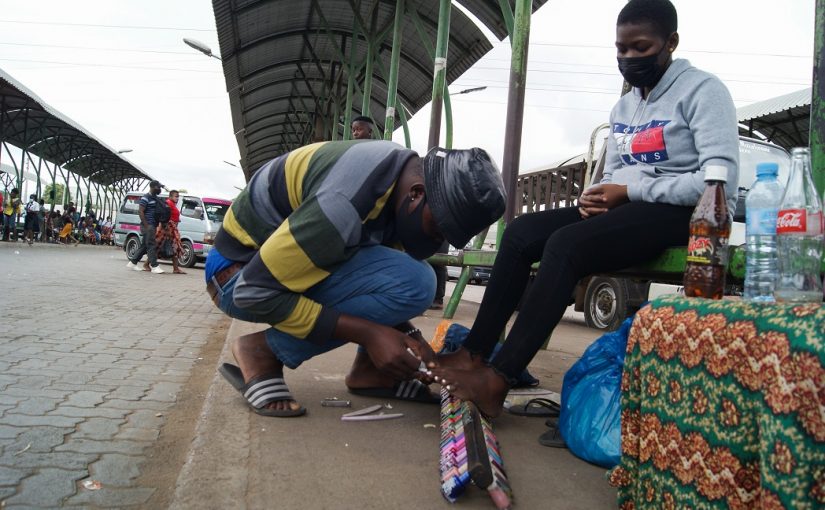AfricaPress-mozambique: Twenty-two-year-old Fabião Mucandzi carries on his shoulder a rainbow-coloured wooden strip with dozens of holes, in each a bottle of nail varnish.
With these, he paints nails in the streets of Maputo. “I do this so I don’t have to rob anyone. This way, I can buy credit [mobile phone airtime] and Internet to support my studies and do other things,” he tells Lusa.
Sitting at the public transport stop, he has been enduring the hustle and bustle of Praça dos Combatentes for almost four years, with the ambition of being able to finance his own studies.
“With the coronavirus, nothing is moving. It’s hard for me to pay school fees. Everything is stopped. Sometimes I have to take out loans to pay the monthly tuition fee,” he laments.
Despite the uncertain future, for Fabião, painting nails is more an art than just a way of avoiding unemployment.
“I consider my work an art. The art that I have in my hands and that I am sharing with others,” he says.
It was this “art” that won over Bibi de Fátima, one of the many Mozambican women who get their manicures and pedicures on the streets of Maputo.
“I do my nails here because I like their work, they’re accessible and they’re friendly. That’s why I opt for them,” she says while waiting for the bus.
Standing straight, she watches Fabião work finger by finger, oblivious to the commotion in the square.
Belgito Carlitos, 24, fled from hunger in the interior of Inhambane in 2014 and today earns a living as a street manicurist in Maputo.

The dream of a better life in the capital began in childhood in the suburbs of Inhambane, 478 kilometres from the capital, and it wasn’t long before Carlitos discovered a vocation: taking care of his clients’ toes and hands, despite the stigma and prejudice that men suffer in this type of profession, especially in rural areas.
“I started by watching what others were doing. First I sold earrings [on the streets of Maputo] and then I started painting nails. Today, I’m a professional,” he tells Lusa with confidence as he attends to one of his clients.
Simple, fast and cheap, with prices ranging between five meticais (0.06 euro cents) to 250 meticais (three euros), the Belgito treatment is almost always a riot of colour.
After almost eight years, he says he is famous in his neighbourhood, and has even managed to set up a small salon in Laulane, on the outskirts of Maputo.
But with the impact of Covid-19 restrictions has hit custom, and bills are mounting up.
“Before the coronavirus, we were able to treat 10 to 15 people a day, but now we are not making much money,” he says. But, he can still pay the rent for the house he shares with his colleagues, he says.






